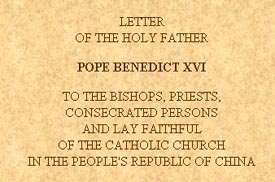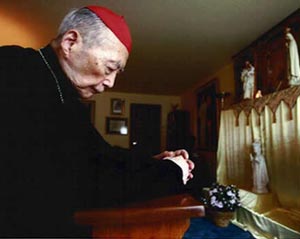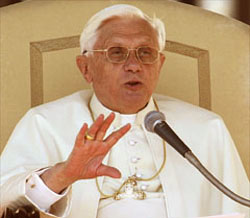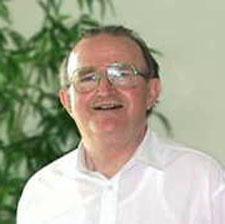 |
Traditionalist Issues
Aftermath of the Papal Letter to Chinese Catholics – Part I
A Shameful Silence
Margaret Galitzin
I’ve been watching the news carefully regarding the aftermath of Pope Benedict’s disastrous Letter to the Church in China to see the reaction of the Catholic Patriotic Association (CPA), the Communist-controlled “open church.” Will it agree to dialogue with the Vatican? After more than a half-century of obduracy, will it begin to cooperate with this Pope eager to offer it benefits?

The Letter was signed May 27, 2007, and made public on June 30, 2007 |
Then there is the underground Catholic Church. How will those Catholics who have heroically resisted the constant persecution of the Communists since 1949 react to the Pope's request that they unite with the CPA? The faculties their Bishops were given to make other Bishops and priests - which obviously allows the underground movement to develop - were revoked by Benedict XVI. The prohibitions against concelebrating Masses with the CPA clergy were removed as well. It is a clear attempt to merge the underground Catholic resistance with the above-ground Communist-sponsored church. Therefore, it is a process turned toward the underground Church's disappearance.
Another question: What about the Cardinal Kung Foundation (CKF), a noble institution whose goal is to spread news about those glorious Catholics of the Catacombs and their sufferings, and offer them material and psychological support? How will it react? The letter of the Pope is contrary to CKF’s very purpose and methods, since the latter openly supports the underground Church in its opposition to the CPA. In an Open Letter on CKF’s excellent website, it is demonstrated that the CPA is not Catholic, but in schism. CKF begs the Holy See to formally declare the CPA as such: “We do not understand your silence on this issue and need your unequivocal answer: Why has the Holy See not declared the CPA to be in schism?”

Cardinal Kung, imprisoned for 30 years, became a symbol of resistance for the Underground Church |
The “unequivocal answer” CKF has received is the exact opposite of what it expected. Benedict XVI’s Letter to the Chinese affirms that the Patriotic church is not in schism, and, instead, the underground Catholics are the ones requested to end the “unnatural situation” of a Catacomb Church by entering into relations with the Communists.
Will the Cardinal Kung Foundation and all Catholics around the world calmly accept the scandalous destiny decreed in this Letter? The true Catholics are ordered to merge with their counterfeits in order to please the Communist regime. I find it hard to believe that the Pope gave this order; harder still, that those glorious Catholics accustomed to all kinds of betrayals will obey it.
I was shocked by the Vatican’s pro-Communist stance in this document. The shock became greater in face of the stunning silence of traditionalist Catholics regarding this papal stance. I was expecting a violent protest from their ranks, usually so militant, especially because traditionalist Catholics are by nature strongly anti-Communist. They know that you cannot have any pacific co-existence with a regime that denies the teachings of the Catholic Church. I refer not only to the Papal Primacy, but also the Catholic teachings regarding the morality of the family – monogamic marriage, abortion, birth control, divorce, education of the children, euthanasia – and the social teachings regarding the legitimacy of private property. Keenly aware of the prediction made by Our Lady at Fatima that Communism would spread her errors throughout the world, traditionalist Catholics are generally vigilant against any compromise with it.
Instead of the anticipated protest of traditionalists, there has been an almost complete silence, and even some attempts to justify the Pope’s letter on the part of some who skip over its primary aims and quote lines where he reaffirms the need for religious freedom protection and the Church’s right to independent government. Such partial quotes ignore the crucial parts of the letter:
- Plea for the underground Church to register with the civil government;
- Revocation of previously granted faculties and privileges;
- Acceptation of the majority of the CPA bishops;
- Vatican willingness to negotiate with the regime over the appointment of new bishops;
- Approval for the concelebration of clergy from the underground Church with CPA clergy who are “in communion” with Rome.
The revocation of all faculties previously granted to underground Chinese Bishops’ and the pastoral directives concerning them seems to me to be one of the key points of this document. The Pope explained the decision with these words:
Considering in the first place some positive developments of the situation of the Church in China, and in the second place the increased opportunities and greater ease in communication, and finally the requests sent to Rome by various Bishops and priests, I hereby revoke all the faculties previously granted in order to address particular pastoral necessities that emerged in truly difficult times.
Let the same be applied to all directives of a pastoral nature, past and recent. The doctrinal principles that inspired them now find a new application in the directives contained herein (n. 18).
What were these “positive developments?” Certainly not the three bishops who were appointed in May by the CPA without any notice to the Vatican. Not the new persecutory measures on imprisoned bishops and priests that also intensified in May. What history shows is that every conciliatory gesture by the Vatican to the CPA is met by stony coldness, or downright belligerence. The CPA always responds, as it is doing now, with the same two demands, repeated ad nauseam: Abandon Taiwan and stop interfering in China Church affairs, which means the regime will not accept the authority of Rome to appoint bishops.

Benedict revoked all the privileges that supported the underground Catholic Church |
So far, no “positive developments” nor “increased opportunities” that would warrant such a complete revocation of the rights of the underground Church to continue on its faithful path.
Some readers may wonder about the nature of these faculties and special privileges the Pope revoked. Here is a bit of information.
On June 29, 1958, after condemning the CPA, Pope Pius XII in his Encyclical Ad Apostolorum Principis declared the election of CPA bishops invalid and their consecrations “criminal and sacrilegious,” i.e., illicit. One year later on June 29, 1959, in his encyclical Ad Petram Cathedri, Pope John XXIII recalled and renewed his predecessor’s condemnations (CKF, Open Letter). In view of the persecution launched against the Catholic Church in China, the Holy See began to offer special assistance for its development and growth by way of privileges. The most widely known were given in 1978, 1981, and 1988.
In 1978, for example, the Congregation for the Evangelization of Peoples allowed the underground Catholic clergy in China to go beyond diocesan boundaries and administer Sacraments to underground Catholics anywhere. Another exception allowed mainland Bishops to ordain Catholic men as priests if they were firm in the faith, virtuous, willing to observe celibacy and loyal to the Pope. No seminary training was required.
In 1988, the Congregation issued the “Eight Point Directive on Dealings with China,” which required the underground clergy to have no communicatio in sacris (participation in religious ceremonies) with bishops and priests belonging to the CPA. The CPA bishops and priests were not to be invited or even allowed to celebrate religious functions, either in the underground churches or oratories. The faithful were told not to assist at Mass or receive the Sacraments in the CPA churches (“Vatican Revokes all past faculties and privileges granted to China Church,” ECA News.com, July 6, 2007).

Vatican's Fr. Heyndrickx: "No longer any reason for an underground Church" |
These were directives meant to strengthen the underground Catholic communities. Revoking them is sure to weaken, or even destroy, them. This was apparent to Fr. Jeroom Heyndrickx, Belgian expert and Vatican consultant on the Catholic Church in China, who wrote in his reflections on the Pope’s Letter:
“There is at present no longer any reason to keep an underground Church community going in China … The Pope says: only one Catholic Church exists in China. Let Chinese Catholics peacefully celebrate the Eucharist together” (“Pope’s Letter Begins New Phase in China Church History,” UCA News online, July 6, 2007).
So, where is the protest of traditionalist Catholics to this papal gesture which can only be qualified as a betrayal? Their support has always been for the underground Chinese Catholic Church, loyal to the Papacy. Could it really be that traditionalists are so giddy over the Motu Proprio - so eager to paint this Pope as conservative or “converted” - that they fear to upset any waters by speaking out against the delivering of 10 million heroic Catholics to Communism?
If so, this is not a moment of triumph, but one of shame.
Continued

Posted August 9, 2007

Related Topics of Interest
 Benedict Delivers Chinese Underground Catholics to Communism Benedict Delivers Chinese Underground Catholics to Communism
 Has the Pope Forgotten What Communism Is? Has the Pope Forgotten What Communism Is?
 Reactions to Benedict’s Letter to China Reactions to Benedict’s Letter to China
 The Motu Proprio, After the Emotions The Motu Proprio, After the Emotions
 Cheese in Mousetrap Cheese in Mousetrap
 Inadmissible Concessions, Once Again Inadmissible Concessions, Once Again
 Conservatives, Traditionalists, and Counter-Revolutionaries Conservatives, Traditionalists, and Counter-Revolutionaries
 Revolution and Counter-Revolution - Overview Revolution and Counter-Revolution - Overview

Related Works of Interest
|
Traditionalism | Hot Topics | Home | Books | CDs | Search | Contact Us | Donate

© 2002- Tradition in Action, Inc. All Rights
Reserved
|
 |
|